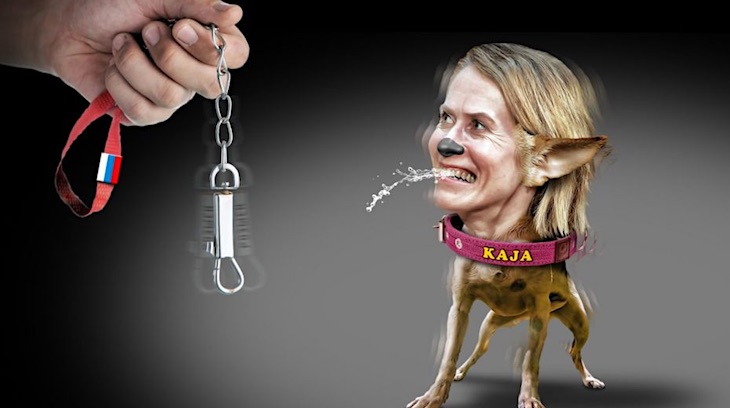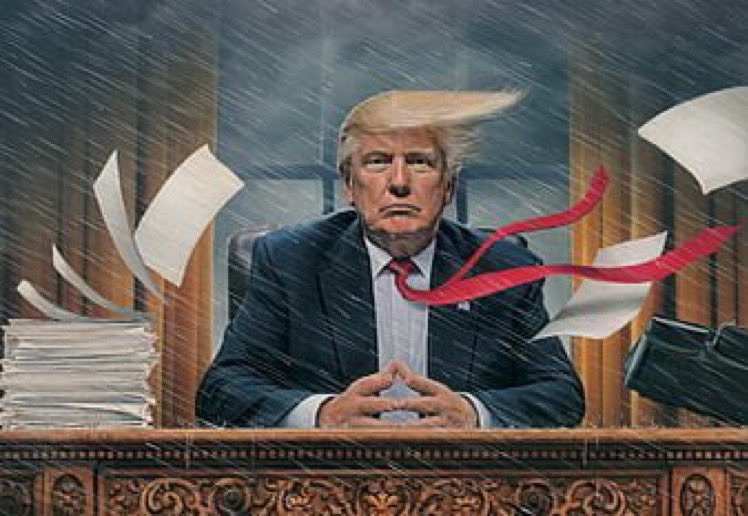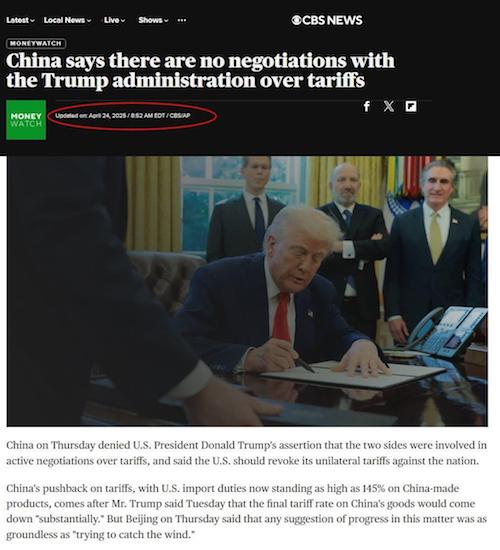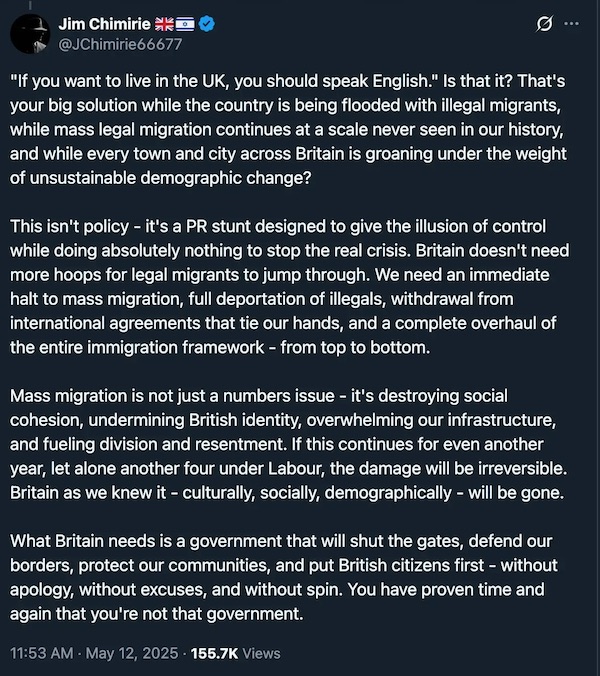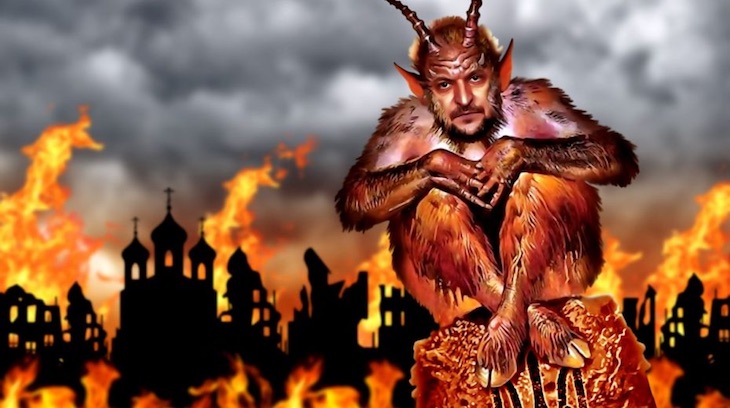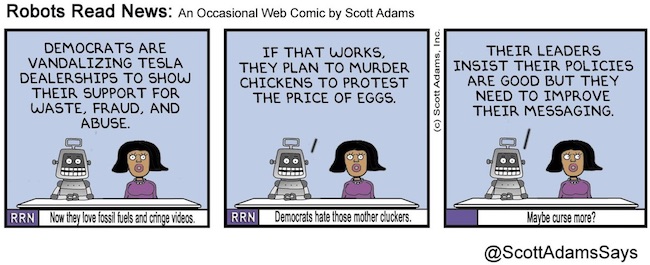
Pablo Picasso Guernica 1937 (I turned it 90°, so you can see)



https://twitter.com/kylenabecker/status/1910329166995607765
SAVE
Chamath
O’Leary
RFK


Trump has two envoys in/for Ukraine right now. One is General Keith Kellogg, whose task is to talk to Zelensky and Kiev. The other is Steve Witkoff, who has a much broader portfolio. One moment he’s discussing the Middle East with various parties, the next he holds a four hour meeting with Putin in St. Petersburg. Witkoff told Trump this week, before his meeting with Putin, that “recognizing Russian ownership of Lugansk, Donetsk, Zaporozhye, and Kherson was the swiftest path to halting the war”. To which Kellogg responded that Zelensky would never accept that.
Kellogg ponders a plan that involves peacekeeping forces and -zones with UK, France and Ukraine troops. Which Russia will not accept. It’s very easy this way for Zelensky to halt any peace proposals. It leaves two questions: 1/ who’s winning? and 2/ how much patience does Trump have? NATO will never concede that Russia won and now gets to call the shots. But Russia did win. UK, France and Ukraine cling on to hopes that Trump will support their side and start a world war. Trump wants peace.
• Kremlin Reveals Content Of Putin’s Talks With Trump Envoy Witkoff (RT)
The discussions between Russian President Vladimir Putin and White House special envoy Steve Witkoff on Friday involved “aspects of the settlement of the Ukraine conflict,” the Kremlin has announced, declining to provide further details. Witkoff visited Russia on Friday and met with Putin in St. Petersburg. The meeting lasted over four hours and the content of the talks has been largely kept under wraps by Moscow and Washington. However, White House Press Secretary Karoline Leavitt addressed the issue during a press briefing earlier in the day when asked by a reporter about the purpose of Witkoff’s visit to Russia. According to Leavitt, the visit was aimed at facilitating direct US communications with the Kremlin as part of a broader effort to negotiate a ceasefire and eventual peace agreement in the Ukraine conflict.
The Trump administration faced growing internal divisions this week after Witkoff allegedly proposed a ceasefire plan that would recognize Russian control over four eastern regions claimed by both Moscow and Kiev, Reuters reported on Friday citing anonymous sources. During a White House meeting with President Donald Trump last week, Witkoff argued that recognizing Russian ownership of Lugansk, Donetsk, Zaporozhye, and Kherson was the swiftest path to halting the war, the outlet’s sources said. General Keith Kellogg, Trump’s Ukraine envoy, reportedly pushed back, stressing Ukraine would not accept full territorial concessions. The meeting reportedly concluded without a decision from Trump, who has repeatedly said he wants to broker a ceasefire by May. Witkoff subsequently traveled to Russia on Friday for talks with Putin.
The episode has deepened rifts within the Trump administration, as officials debate how to resolve the Ukraine conflict, Reuters wrote. Witkoff’s approach, previously outlined in a March interview with Tucker Carlson, has reportedly alarmed both Republican lawmakers and US allies. “They’re Russian-speaking,” Witkoff told Carlson of the eastern territories. “There have been referendums where the overwhelming majority of the people have indicated that they want to be under Russian rule.” Several Republicans reportedly contacted National Security Adviser Mike Waltz and Secretary of State Marco Rubio to raise concerns about Witkoff’s stance, criticizing him for echoing Russian rhetoric.
A recent dinner with Russian envoy Kirill Dmitriev, who until recently was under US sanctions, further stirred controversy. Originally planned at Witkoff’s home, it was moved to the White House after security concerns were raised. Despite criticism, Witkoff retains strong backing from Trump and some administration officials. Waltz praised his efforts, citing his business background and recent diplomatic activity, including securing the release of US citizen Marc Fogel from Russia.
Read more …

“Medvedev, said that the potential emergence of any NATO “peacekeepers” in Ukraine would mean a war between the bloc and Russia.”
• Trump’s Kiev Envoy Clarifies Proposal To ‘Divide Ukraine Like Postwar Berlin’ (RT)
US President Donald Trump’s special envoy to Ukraine, General Keith Kellogg, has rejected the notion that he proposed partitioning Ukraine like post-WWII Germany, accusing The Times of misrepresenting his remarks about a Cold War-style post-ceasefire security arrangement. Kellogg told The Times in an interview published on Friday that British and French – but not American – troops could lead a Western military force positioned west of the Dnepr River, while Ukrainian forces would hold territory further east. He also suggested establishing a demilitarized zone (DMZ) roughly 18 miles (30 kilometers) wide along the current lines of control to prevent direct clashes with Russian forces.
“You could almost make it look like what happened with Berlin after World War Two, when you had a Russian zone, a French zone, and a British zone, a US zone,” said Kellogg, a retired US Army lieutenant general, appointed by Trump to deal directly with Ukraine’s Vladimir Zelensky. Kellogg acknowledged that Moscow “might not accept” the proposed zones of control, and claimed that a DMZ would create conditions for a “sustainable” ceasefire and would “not be provocative at all” to Moscow. The British newspaper ran its story with the headline “Trump envoy: We can divide Ukraine like postwar Berlin,” prompting Kellogg to accuse the publication of taking his words out of context.
“The Times article misrepresents what I said,” Kellogg wrote on X on Friday evening. “I was speaking of a post-ceasefire resiliency force in support of Ukraine’s sovereignty. In discussions of partitioning, I was referencing areas or zones of responsibility for an allied force (without US troops). I was NOT referring to a partitioning of Ukraine.” The Times report, however, noted that Kellogg’s idea implies that any final settlement would involve Kiev relinquishing claims to territories already controlled by Russia – a point that echoes proposals recently floated by Trump’s Russia envoy, Steve Witkoff.
Witkoff, who met Russian President Vladimir Putin in St. Petersburg on Friday, had previously argued that recognizing Russian ownership of Lugansk, Donetsk, Zaporozhye, and Kherson was the swiftest path to halting the conflict. The suggestion, reportedly voiced during a White House meeting last week, has triggered internal debate within the Trump administration, with Kellogg allegedly pushing back against full territorial concessions. Kiev’s backers remain split on a proposed “reassurance force” that could potentially be deployed to Ukraine after hostilities between Kiev and Moscow end. Following the latest meeting of the “coalition of the willing” – composed of some 30 predominantly EU and NATO member states – in Brussels on Thursday, only six Western nations expressed readiness to send troops, according to AFP.
Moscow has repeatedly warned the West against deploying troops to Ukraine under any pretext, specifically objecting to forces from any NATO countries ending up in the country. Last month, former Russian president and deputy chair of Russia’s Security Council, Dmitry Medvedev, said that the potential emergence of any NATO “peacekeepers” in Ukraine would mean a war between the bloc and Russia.
Read more …

“The Russian Foreign Ministry previously said the plans of some EU countries to send “peacekeepers” to Ukraine are a provocative step aimed at maintaining unhealthy illusions in Kiev..”
• Kellogg Blasts Times for Misrepresenting His Words on Ukraine (Sp.)
US President Donald Trump’s special envoy Keith Kellogg accused the Times newspaper of misrepresenting his words about control zones in Ukraine, clarifying that he did not mean “partitioning” the country itself.
The Times wrote in an article that Kellogg suggested partitioning Ukraine into control zones after the end of the conflict like Berlin after World War II, but without US ground forces. Kellogg, the report said, proposed dividing Ukraine into several control zones, where the military of several countries would be located: British and French troops could be deployed to western Ukraine as a “reassurance force.” Between them and the Russian forces there could be “Ukrainian forces and a demilitarized zone.”
“The Times article misrepresents what I said. I was speaking of a post-cease fire resiliency force in support of Ukraine’s sovereignty. In discussions of partitioning, I was referencing areas or zones of responsibility for an allied force (without US troops). I was NOT referring to a partitioning of Ukraine,” Kellogg wrote on X, attaching a link to the article. Earlier in April, Alexey Polishchuk, Director of the Second CIS Department at the Russian Foreign Ministry, told Sputnik that London and Paris’ discussions on sending deterrent forces to Ukraine were preparations for foreign intervention. According to Polishchuk, Kiev is known to be rejecting the peace process and is even sabotaging the moratorium on strikes against energy facilities. Russian Foreign Ministry spokeswoman Maria Zakharova, in turn, previously stated that any foreign military presence in Ukraine would be viewed as a threat to Russia and carries the risk of a direct military clash.
Russia’s Foreign Intelligence Service (SVR) previously reported that the West would deploy a so-called “peacekeeping contingent” of about 100,000 people in Ukraine to restore its combat capability. The SVR said this would be a de facto occupation of Ukraine. Kremlin spokesman Dmitry Peskov said the deployment of peacekeepers is only possible with the consent of the parties to a particular conflict. According to him, it is premature to talk about peacekeepers in Ukraine. Earlier, he also left without comment statements that Russia would allegedly not be against the deployment of peacekeepers in Ukraine.
On March 6, Russian Foreign Minister Sergey Lavrov emphasized that Russia does not see any possibility for a compromise on the issue of deploying foreign peacekeepers in Ukraine. As the Russian minister specified at the time, if a foreign contingent is deployed in Ukraine, Western countries will not want to discuss the terms of peaceful settlement. The Russian Foreign Ministry previously said the plans of some EU countries to send “peacekeepers” to Ukraine are a provocative step aimed at maintaining unhealthy illusions in Kiev.
Read more …

“..Moscow has firmly rejected the idea of NATO troops being stationed in Ukraine.”
• Zelensky Mustn’t Govern Russians He Despises – Lavrov (RT)
Vladimir Zelensky’s openly declared hatred for Russians means he must not and will not govern people living in former parts of Ukraine that Kiev seeks to retake, Moscow’s Foreign Minister Sergey Lavrov has stated. In a late March interview with the French daily Le Figaro, Zelensky expressed his disdain for “Russians who killed so many Ukrainian citizens,” asserting that this “hatred” fuels his leadership. Lavrov referenced the comments during a press conference at the Foreign Ministry on Friday, underscoring why Moscow has deemed Kiev’s territorial claims unacceptable. “Who would even hypothetically consider handing over those people to such an individual? Nobody. No way,” he emphasized. Since the Western-backed coup in Kiev in 2014, five Ukrainian regions plus the city of Sevastopol have voted to break away and join Russia. The Ukrainian government has dismissed these referendums as a “sham.”
Lavrov also reminded journalists of Zelensky’s previous derogatory remarks, including statements made prior to the conflict’s escalation in 2022. In 2021, Zelensky urged Donbass residents who identified as Russian to relocate to Russia. That same year, he referred to politicians targeted by his government with personal sanctions as another “species.” The minister accused the Ukrainian government of “legislatively eradicating everything related to Russia and the Russian world: the Russian language, Russian-speaking media, the Orthodox Christianity represented by the canonical Ukrainian Orthodox Church, and much more.”
Such discriminatory policies, he argued, justify labeling the Zelensky administration “neo-Nazi” and contribute to ongoing hostilities. Lavrov asserted that US President Donald Trump recognizes Russia’s red lines and considers “the return to the 1991 borders, as Zelensky keeps demanding” impossible. The Trump administration seeks to mediate a peace deal between Moscow and Kiev, while the UK and France are leading discussions on a proposed “reassurance force” to be deployed in Ukraine if a truce is achieved. Moscow has firmly rejected the idea of NATO troops being stationed in Ukraine.
Read more …

“Sometimes their visits were so sensitive they went in civilian clothing.”
• UK Has Deep Involvement In Ukraine Conflict – The Times (RT)
Britain’s military leadership played a far more extensive and covert role in the Ukraine conflict than previously known, not only designing battle plans and supplying intelligence, but also authorizing secret troop deployments inside Ukraine to deliver weapons training and technical support, according to a report by The Times. While London’s political and military backing for Kiev has been public since the 2014 Western-backed coup, the extent of its involvement after the escalation in February 2022 “remained largely hidden… until now,” the British newspaper wrote on Friday. The Times claimed that British troops were sent into Ukraine in small numbers on several occasions throughout 2022 and 2023, operating discreetly to avoid provoking Russia. In particular, UK forces were deployed to fit Ukrainian aircraft with Storm Shadow long-range cruise missiles and train pilots and ground crews in their use.
“UK troops were secretly sent to fit Ukraine’s aircraft with the missiles and teach troops how to use them,” the publication wrote, noting that it “would not be the first time British troops had been deployed on the ground.” The UK had been delivering thousands of NLAW anti-tank missiles to Kiev and sending instructors to train Ukrainian soldiers in their use since 2015. While British troops were pulled back from Ukraine shortly before the escalation in February 2022, the deteriorating battlefield situation and the urgent need for technical expertise saw small teams of UK personnel redeployed quietly alongside fresh supplies of missiles, the newspaper reported.
London also reportedly played a key role in helping Ukraine prepare its much-touted 2023 “counteroffensive” against Russia – and in mediating between Kiev and Washington when the operation failed to meet US expectations. The newspaper claimed that “behind the scenes” the Ukrainians referred to Britain’s military chiefs as the “brains” of what they called an “anti-Putin” coalition. Former UK Defence Secretary Ben Wallace was even ereportedly nicknamed “the man who saved Kiev” by Ukrainian military officials. “The Americans went to Ukraine only on rare occasions because of concerns that they would be seen to be too involved in the war, unlike Britain’s military chiefs who were given the freedom to go whenever necessary,” The Times wrote. “Sometimes their visits were so sensitive they went in civilian clothing.”
Moscow perceives the Ukraine conflict as a Western-led proxy war against Russia, in which Ukrainians serve as “cannon fodder.” It considers foreigners fighting for Kiev as “mercenaries” acting on behalf of Western governments. Senior Russian officials have suggested that more complex weapon systems provided to Kiev are highly likely operated by NATO staff. The presence of current and former NATO troops has also been tacitly admitted, but never openly confirmed, by Western officials. For example, last year, German Chancellor Olaf Scholz revealed the involvement of British and French forces in preparing Ukrainian missile launches, as he explained why Berlin would not supply similar weapons to Kiev. Earlier this month, a New York Times investigation found that the administration of former US President Joe Biden provided Ukraine with support that went far beyond arms shipments – extending to daily battlefield coordination, intelligence sharing, and joint strategy planning, which were described as indispensable to Kiev’s fight against Russia.
Read more …

“..the “largest military base of NATO is in Romania,” coupled with the 380-mile (612 km) long border that his country shares with Ukraine..”
• NATO Needs Romania To Launch WWIII – Georgescu to Tucker Carlson (RT)
Calin Georgescu, a former Romanian presidential candidate whose bid was controversially invalidated earlier this year, has claimed that NATO wants to “launch World War III from Romania.” In an interview with US journalist Tucker Carlson, he said his staunch pro-peace stance was among the main reasons why he was barred from running for president. The right-wing politician, known as an outspoken critic of NATO, the EU, and Western support for Ukraine, scored a surprise win in the first round of November’s presidential election, receiving 23% of the vote. However, the country’s Constitutional Court swiftly moved in to annul the result over alleged “irregularities” in his campaign. Later, Georgescu was stripped of his right to run for office.
Appearing on Carlson’s podcast on Thursday, the former Romanian presidential candidate alleged that NATO wants to “launch… World War III from Romania.” The politician cited the fact that the “largest military base of NATO is in Romania,” coupled with the 380-mile (612 km) long border that his country shares with Ukraine. “In this situation of course Romania is the asset for [the] European Union, for [French President Emmanuel] Macron in order to launch the war,” Georgescu insisted. “They want to turn NATO [into] an offensive force” and are “pushing for war,” he alleged, adding that “my position was exactly against them.”According to Georgescu, “all my campaign was just concentrate[d] on peace[.] When I said… the word ‘peace’, they immediately alerted… because they need war.” The right-wing politician went on to say that the “majority of Romanian people… have this position against any intervention and any participation [in] war.”
“I was denied [the right to run for president] by the globalist mafia,” the former candidate alleged, further claiming that the people behind the invalidation of his candidacy were the same people who attempted to derail Donald Trump’s presidential campaign in the US, using similar smear tactics. Appearing on ‘The Shawn Ryan Show’ in January, Georgescu similarly suggested that NATO military infrastructure in Romania could be used to launch a major offensive against Russia. Bucharest, a NATO member since 2004, has been expanding the MK Air Base to make it the largest NATO installation in Europe. Moscow has described the base as “anti-Russian” and warned that it would be among the first targets for retaliatory strikes in a military conflict.
Read more …

“Trump paused the tariffs, because the tool worked. Seventy-five countries have agreed to negotiate a solution to Trump’s concerns.”
• The Tariff Issue Again (Paul Craig Roberts)
The whore media is doing its best to misrepresent the tariff issue and to cause hysteria that causes stock market volatility and fears of world recession. One of the anti-Trump propaganda ministries that poses as financial media went so far as to claim that Trump has caused a “regime shift whereby US Treasuries are no longer the global fixed-income safe haven.” Once upon a time the New York Times, the Financial Times, the Economist, the BBC, the US TV networks were semi-reliable. Today they are nothing but propaganda ministries. Trump has “paused” the threatened tariffs. Why? Because as I have reported in columns and interviews they are a negotiating tool with which to reach agreements. Trump paused the tariffs, because the tool worked. Seventy-five countries have agreed to negotiate a solution to Trump’s concerns.
How did the excrement that pretends to be a media report Trump’s success? “The most significant retreat by Trump in his term so far.” “Faced with a world recession, sharp selloff of equities and bonds and plunge in oil prices, Trump abandoned his crackpot tariffs.” The Western media, especially the one in the US, has never served the West well. The US media covered up the assassinations of President John Kennedy and his brother Robert Kennedy. The media first encouraged, then misrepresented, the Vietnam War. The media used the CIA-orchestrated “Watergate” to hound President Nixon out of office. The media tried, but failed, to destroy President Reagan as a somnolent Grade-B movie actor who slept through cabinet meetings.
The media covered up 9/11. The media supported obvious lies, such as “Saddam Hussein’s weapons of mass destruction,” “Assad’s use of chemical weapons against his own people,” accused Gaddafi of ” being an authoritarian administration that systematically violated human rights and financed global terrorism in the region and abroad” (Wikipedia, the worst liar on earth). The media makes excuses, or does not cover, Israel’s extermination of Palestine and the Palestinian people. The media lies through their teeth about “the Russian invasion of Ukraine,” about alleged evils of Iran and China. When people in the Western world are confronted by nothing but lies and propaganda serving as news, what understanding can they have?
Consider the Iranian issue. Iran has not threatened the US in any way, yet labors under Washington’s sanctions and war plans to attack Iran. For many years the Israel Lobby has been trying to get Americans to attack Iran for Israel. Trump, who appears to be an Israeli puppet instead of a strong American president, is threatening Iran with devastating attack. But does he mean it, or is it, like the tariff threat, just another negotiating instrument? If I were Trump, I would not want any wars, because wars are all-consuming, and the domestic agenda would be put on the back burner. I think that Trump wants to avoid all wars so that he can deal with America’s real enemy: the American Establishment. It will be interesting to see who is strongest, Trump or the war establishment.
Read more …

We won’t go back to what was before. Something new must be found.
• China Dismisses US Tariff ‘Numbers Game’ (RT)
China likened the United States’ tariff policy to a ‘numbers game’ with no practical meaning after the administration of US President Donald Trump imposed multiple rounds of duties on Chinese imports over the past few weeks. In a statement on Friday, the Chinese government accused Washington of using tariffs as a weapon for bullying and coercion, while hitting back with its own reciprocal trade duties. ”Even if the US continues to impose even higher tariffs, it would no longer have any economic significance and would go down as a joke in the history of world economics,” a spokesman for the Ministry of Commerce said, as cited by Reuters. The US has imposed four major tariff hikes on China in just over two months, with the latest escalation on Wednesday bringing the duties from an initial average of 20% to a cumulative rate of 145%.
China has retaliated, announcing its latest reciprocal hike to 125% on all American imports on Friday. The Ministry of Commerce said Beijing would not retaliate any further, indicating that it may turn to other ways of responding and vowing to “fight to the end.” Trump argues that the increased duties are needed to address trade imbalances and stop China from “ripping off the USA.” Earlier this week, he opined that the “proud” Chinese would have to “make a deal at some point.” China has also filed a lawsuit with the World Trade Organization challenging the latest US tariff hike, asserting that Washington’s actions have significantly disrupted the global economy. The trade dispute between the world’s two largest economies has caused extreme volatility in global stock markets, sent oil prices to four-year lows, and caused concerns regarding global supply chains.
Read more …

Who gets the long end of the stick?
• 10 Tariff Questions Never Asked (Victor Davis Hanson)
1. President Donald Trump’s so-called trade war. Many call the American effort to obtain either tariff parity or a reduction in the roughly $1 trillion trade deficit and 50 years of consecutive trade deficits a “trade war.” But then what do they call the policies of the past half-century by Europe, Asia, China, and others to ensure asymmetrical tariffs, pseudo-health and security trade restrictions, and large surpluses? A trade peace? Trade fairness?
2. Do nations prefer surpluses or deficits? Why do most nations prefer trade surpluses and protective tariffs? Are Europe, Asia, China, and others stupid? Are they suicidal in continuing their trade surpluses and protective or asymmetrical tariffs. Is the United States uniquely brilliant in maintaining a half-century of cumulative trade deficits? Do Americans alone discover the advantages of a $1 trillion annual trade deficit and small or nonexistent tariffs? Why don’t America’s trading partners prefer deficits like ours—given we supposedly believe they are either advantageous or perhaps irrelevant?
3. Would our trade partners prefer to trade places with us? Would our trade partners prefer to have America’s supposed benefits of a $1 trillion trade deficit? Would the United States then “suffer” like they do by running up $200 billion annual surpluses?
4. What if wages went up at the rate of the stock market? What would now be the reaction of the stock market if over the last decade wages had increased at the rate of stocks—and the stocks at the rate of wages?
5. Is Wall Street’s panic based on what might happen—or what is happening? Is Wall Street’s meltdown a fear of what might happen in the future? Or is it reacting to March’s latest jobs report that there were 93,000 more jobs created than predicted? Was the Wall Street panic predicated on reports of much lower oil prices? Did the furor arise over the March inflation report that the annualized inflation rate dipped to 2.6% per year?
6. Is the frenzy caused by the Trump economic agenda? Is Wall Street’s worry that Trump’s impending tax cuts, more deregulation, greater budget cuts, and continued efforts to eliminate budget deficits and reduce national debt will stall economic growth?
7. What about North American neighbors? If the U.S. was running a $63 billion-plus trade surplus with Canada, refusing to meet its NATO requirements to spend 2% of gross domestic product on defense, and instead spent only 1.37%, would Canada become concerned? If Mexico were running a $171 billion trade deficit with the U.S., if Americans in Mexico were sending over $60 billion per year out of Mexico to the U.S., and if American drug dealers were making $20 billion by selling fentanyl and opioids to Mexico, would Mexico be angry?
8. Is the Trump agenda bad economic news? Is the current panic over tariffs amplified by Trump’s other policies? Is the sudden end of 10,000 illegal entries a day bothering Wall Street? Are the media furious that the Red Sea is suddenly navigable again, the Houthis in Yemen curtailing their attacks? Is the outrage due to the targeting of approximately $200 billion in budget cuts or plans to shave off $500 billion from the annual budget? Does the conundrum arise because Trump is sanctioning Iran, unapologetically supporting Israel, and seeking an end to the Ukraine War?
9. Was the Biden record preferable? Should Trump try to match former President Joe Biden’s $7 trillion addition to the national debt? Should he return to allowing 12 million illegal aliens into the country? Was the 2021 Afghanistan pullout a good model? Is Wall Street worried that Trump may copy the Biden New Green Deal, his electric vehicle mandates, and more green regulations?
10. Why the negotiations and why now? Why are 70 countries now wishing to negotiate tariffs with America either down to zero or reciprocally to the same rate as ours? Is that a good thing? If so, why did our trade partners not wish to lower their trade barriers far earlier? Did they suddenly and spontaneously decide they were acting unfairly and, on their own prompt, now want to make amends? What’s next? If there soon is a rush of nations to cut a deal with the U.S. and not to be left out of the American market, will there follow another hysterical Wall Street spasm—but not to sell, but instead to buy stocks at bargain prices?
Read more …

“Now is not the time to settle for the lowest common denominator, which is always a temptation in politics..”
• Trump’s Tariffs Only the Start. Congress Must Now Cut Taxes, Regulations (DS)
President Donald Trump announced historic tariffs on April 2—“Liberation Day”—to ensure that America is no longer “looted, pillaged, raped, and plundered” by other nations. On Wednesday, the president announced a 90-day pause on the tariffs and lowered the tariff rate on most nations to 10%. He also raised tariffs on China to 125%. His bold leadership, which quickly brought 75 countries to the negotiating table, he said, should be applauded. Clearly, his strategy is working: America is gaining leverage, and China is becoming more and more isolated. While conservatives have been divided and disorganized about how to respond to the president’s policy, with almost all Republicans in Washington still watching from the sidelines, we’re calling on Americans to unify around a “yes, and” agenda.
That means saying yes to strategic, reciprocal tariffs that target China and other trade abusers—based on their barriers, not simply the balance of trade—as we work toward true free and fair trade. And it means insisting that tariffs are most effective when paired with a broad array of conservative policies that alleviate economic pain on the American people. While Trump works to liberate us from foreign abuses, congressional Republicans must fight to liberate Americans from the burdens of federal regulations, mandates, and taxes. First, we must not settle for extending the status quo on tax relief. Thanks to the majorities Trump delivered in November, Republicans must pursue deeper tax reform through reconciliation. Every penny raised from tariffs should be offset with pro-growth tax cuts.
Making the Tax Cuts and Jobs Act permanent is a good start, but we also must remove every remaining tax penalty on expanding hiring and business operations in America by adopting full and immediate expensing for all investments. Pairing this with a simplified flat tax for all is even better. Congress should collapse the personal income and corporate tax rates to 15%. Second, Congress should work alongside the Trump administration, using the reconciliation process, to transform the current 10% universal tariff into a true border-adjusted tariff. That means applying a universal 10% tariff on all imports, while granting a matching 10% credit to all American exports. That isn’t just smart policy—it’s a long-overdue correction to a global tax system that has punished American industry for decades. We’ve let foreign goods pour into our markets tax-free, while our manufacturers are taxed at home and slapped again abroad. That’s not free trade—it’s economic surrender.
And no country has abused this broken system more brazenly than China, which has cheated on trade, exploited our openness, and gutted the U.S. industry while Washington looked the other way. If we want to rebuild our economy, secure our supply chains, and end our dependence on adversarial regimes, then a border adjustment tariff must be part of the conservative economic playbook. As a bonus, these revenues can be used to offset lost revenue from the lower tax rates we are calling for. Third, Republicans must finally get serious about cutting spending—not with half measures or messaging bills, but with real, structural reform. Through reconciliation, Congress should significantly cut mandatory spending riddled with waste, fraud, and abuse.
Now is not the time to settle for the lowest common denominator, which is always a temptation in politics. If we are to undo the fiscal and inflationary damage done by the previous administration and decades of fiscal irresponsibility, we must go big and take advantage of this historic electoral mandate. Then, through the appropriations process, we must slash the bloated discretionary budget that fuels the unchecked growth of the federal bureaucracy. In the meantime, the Department of Government Efficiency must be fully unleashed to do its job—scrutinizing every dollar, rooting out inefficiency, and holding agencies accountable. This is how we restore fiscal integrity and prove to the American people that their government works for them, not the other way around.
Read more …

“..the high court has for procedural reasons issued back-to-back rulings undoing restrictions district judges imposed on the Trump administration..”
• Dem-Appointed Federal Judges Are the Big Losers at Supreme Court This Week (DC)
The Supreme Court has struck down orders issued by Democrat-appointed district court judges five times in the past week. Without addressing the merits of the issues—which include consequential questions about immigration, funding, and the president’s authority to remove agency officials—the high court has for procedural reasons issued back-to-back rulings undoing restrictions district judges imposed on the Trump administration. “I think that the recent spate of Supreme Court decisions blocking lower court rulings against the Trump administration indicates that a majority of the justices are growing tired of district court judges issuing broad rulings, often in the form of nationwide injunctions, when they lack jurisdiction and are equally concerned about these judges ordering agencies to disburse millions, if not billions, of taxpayer dollars that will be impossible to recoup if the government ultimately prevails,” John Malcolm, director of the Meese Center for Legal and Judicial Studies at The Heritage Foundation, told the Daily Caller News Foundation.
Chief Justice John Roberts put a temporary hold Wednesday on orders forcing the reinstatement of two fired agency leaders, clearing the way for President Donald Trump to remove Cathy Harris from the Merit Systems Protection Board and Gwynne Wilcox from the National Labor Relations Board. While asking the Supreme Court to quickly block the lower court orders, the administration also asked the Supreme Court to grant certiorari to consider the matter on its merits. Roberts ordered fired officials to offer a response to the administration by April 15. Another Supreme Court ruling from Tuesday reversed a lower court decision requiring the administration to reinstate over 16,000 fired federal employees, finding some of the organizations that sued did not have standing.
The Supreme Court blocked two lower court orders dealing with immigration issues on Monday. Roberts temporarily halted an order that would have required the return of Kilmar Abrego Garcia, an alleged MS-13 member living in Maryland with his American wife, to the United States after he was deported in error. In a 5-4 decision, the majority also permitted the administration to enforce the Alien Enemies Act of 1789, a wartime authority that allows the president to remove citizens of a hostile nation, to deport alleged members of the Tren de Aragua gang to El Salvador. The majority blocked the order issued by D.C. District Court Chief Judge James Boasberg because the case was brought in the wrong venue, but stressed that detainees are still entitled to judicial review.
The three liberal justices, along with Justice Amy Coney Barrett, dissented from the ruling, with Justice Sonia Sotomayor calling the majority’s decision an “extraordinary threat to the rule of law” and Justice Ketanji Brown Jackson saying it should raise concern for “lovers of liberty.” Following the ruling, a Trump-appointed federal judge in Texas temporarily blocked the administration on Wednesday from removing individuals held in the El Valle Detention Center under the Alien Enemies Act. A Clinton-appointed judge in the Southern District of New York likewise halted deportations in his district under the act. The Supreme Court blocked an order in another 5-4 decision Friday that directed the Trump administration to pay out millions of dollars in teacher training grants, which it halted as part of its effort to cut programs related to diversity, equity and inclusion.
“The Supreme Court has indicated in very strong terms that, rather than seeking out liberal district court judges in the bluest of blue states, people who think they are being unlawfully detained should file habeas petitions where they are being held, former government officials who believe they were wrongfully terminated should go to the Merit Systems Protection Board, and government contractors who believe they are owed money should go the Federal Court of Claims,” Malcolm told the Daily Caller News Foundation. “As to the ultimate merits of these claims, I believe the administration will prevail in most of these cases, but, of course, that remains to be seen.” White House assistant press secretary Taylor Rogers said in a statement to the Daily Caller News Foundation that seeking relief on the emergency docket “was necessary for the President to quickly deliver his agenda for the American people without unlawful interruption.” “President Trump secured five wins in six days in the Supreme Court, because it is finally taking steps to reign in rogue judges who seek to undermine President Trump’s authority,” Rogers said.
Read more …

“..newly-appointed US Attorney for the New Jersey federal district, Alina Habba, opened a criminal investigation against Gov. Murphy for “obstruction and concealment.” That means, possibly, jail. Badda-bing! This ain’t no foolin’ around.”
• The Wicked Flee (James Howard Kunstler)
The decade-long treasonous hectoring of Mr. Trump keeps on coming, you understand, for the simple reason that there have been absolutely zero consequences for any of the vicious rogues behind it. Not so much as a rap on the knuckles for seeking to overthrow a president, steal elections, hide high crimes, rob the treasury, and recklessly frame the innocent. And suddenly this week, as startling as a mythic goddess of justice riding a spring zephyr, comes a brisk demonstration of exactly what-to-do. Days ago, Governor Phil Murphy of New Jersey ordered his state police to not cooperate with federal immigration enforcement officers (ICE) — a nice bit of grandstanding for a guy seeking to occupy the Democratic Party’s leadership vacuum. So, Thursday night, newly-appointed US Attorney for the New Jersey federal district, Alina Habba, opened a criminal investigation against Gov. Murphy for “obstruction and concealment.” That means, possibly, jail. Badda-bing! This ain’t no foolin’ around.
The reason the Democrat pols and their activist agents pule and mewl about “retribution” is because they know they are guilty of so many manifest crimes against the country and against decency, that a fair system would have jailed or hanged them by now. They evaded their reckonings only because their own filthy mitts gripped the levers of justice until very recently. Since January 20, that has obviously changed. But two questions have dogged the necessary restoration of fairness and good faith in the backbone of government we call the law. 1) Since the culpable are such well-known figures — the Clintons, Obama, Biden, Comey, Brennan, Mayorkas, Garland, Wray, Fauci, Collins, Pelosi, Eisen, Weissmann, McCord, Schiff, and dozens more — how do you seek justice without appearing to “go after” individuals in the old Soviet mode of “show me the person and I’ll find you the crime”? And 2) where do you begin with such a cosmic-scale panorama of treasonous malfeasance spanning many years and many theaters-of-action?
I’d say US Attorney Alina Habba’s move this week is an excellent place to start. For one thing, Governor Murphy’s defiant act is a fresh crime, only days old, and a clear-cut one: you can’t order state officials to flout federal law, especially where public safety is concerned. Ms. Habba smacked him instantly, like an insolent biting insect. Now, follow through. Prosecute. Mere apologies not accepted. No “mulligan” on that shot. If she brings a case, then other mayors and governors of the many self-proclaimed “sanctuary” jurisdictions around the country, trolling for virtue brownie points in their Woke waters, will rethink their lawless posturing. Couple of other good starts just this week. Mr. Trump issued executive orders yesterday that will afford a fresh look into some older but critical crimes against the nation. One directs US Attorney General Bondi to investigate the actions of a key player in wide-ranging 2020 election mischief. From the White House memo itself:
Christopher Krebs, the former head of the Cybersecurity and Infrastructure Security Agency (CISA), is a significant bad-faith actor who weaponized and abused his government authority. Krebs’ misconduct involved the censorship of disfavored speech implicating the 2020 election and COVID-19 pandemic. CISA, under Krebs’ leadership, suppressed conservative viewpoints under the guise of combatting supposed disinformation, and recruited and coerced major social media platforms to further its partisan mission. CISA covertly worked to blind the American public to the controversy surrounding Hunter Biden’s laptop. Krebs, through CISA, promoted the censorship of election information, including known risks associated with certain voting practices. Similarly, Krebs, through CISA, falsely and baselessly denied that the 2020 election was rigged and stolen, including by inappropriately and categorically dismissing widespread election malfeasance and serious vulnerabilities with voting machines. Krebs skewed the bona fide debate about COVID-19 by attempting to discredit widely shared views that ran contrary to CISA’s favored perspective.
Next, the White House directed an investigation of Homeland Security officer Miles Taylor who proclaimed, during the first Trump term in an anonymous New York Times op-ed, that he was party to “a resistance within the Federal Government that ‘vowed’ to undermine and render ineffective a sitting president. . . . [T]his conduct could properly be characterized as treasonous and as possibly violating the Espionage Act,” the EO said. Sounds serious, a little bit.
Next, in another EO, the White House severely disciplined the swamp law firm Susman Godfrey for its racist DEI activism in the federal agencies it did work for, saying, “Lawyers and law firms that engage in activities detrimental to critical American interests should not have access to our nation’s secrets, nor should their conduct be subsidized by Federal taxpayer funds or contracts.” Hence, Sussman Godfrey lost its security clearances, its federal work contracts were cancelled, and its lawyers are barred from entering federal buildings, including courthouses. FAFO.
Next, Director of National Intelligence, Tulsi Gabbard announced at Thursday’s cabinet meeting that her office has obtained evidence of massive vulnerabilities in voting machines that allow hackers to flip votes. This has long been written off as “baseless conspiracy theory” for years by degenerate news outlets like The New York Times. The key word in Ms. Gabbard’s statement, is “evidence.” You realize, of course, that there is no reason to use vote-counting machines in our election except for the purpose of hacking and cheating. Most other putatively “democratic” nations use paper ballots and manage to tabulate and report election results within twenty-four hours.
Of course, this motley batch of sudden cases — Gov. Murphy of NJ, Chris Krebs, Miles Taylor, Susman Godfrey — are relative outliers to the notorious operations such as RussiaGate, the Schiff-Vindman-Ciaramella-Eisen plot behind Impeachment No. 1, The Covid-19 intrigue, The BLM rampage, the Hunter Biden Laptop ruse (and Biden family’s bribery and treason), J-6 riot and the DNC Pipe-bomb caper, and four years of a wide-open border. That long train of crimes, seditions, and treasons came close to wrecking the country. We know exactly who was behind and involved in all of that. What remains is the heavy-lifting to build cases that can be brought to grand juries in good faith. Perhaps a comprehensive omnibus RICO case can incorporate all of these in what appears to amount to a single, complex orchestrated, long-running attempted coup. Don’t bet that this isn’t coming. And, by-the-way, the infamous “Crossfire-Hurricane” binder was just released last night. As of this writing, there is almost no analysis available yet. Stand by.
Read more …

Legalese: “..the district court could order the government “to facilitate” but not necessarily “to effectuate” the return.
• Court Issues Curious Order in the Garcia Case (Turley)
The media lit up yesterday with the order of the Supreme Court in the case of Kilmar Armando Abrego Garcia, an accused MS-13 member mistakingly sent to El Salvador. I have previously said that the Administration should have brought back Garcia immediately and pushed for deportation under existing laws. Yet, in the order, the Court ordered the government to “facilitate” the return without stating what that means. Last evening, the Court issued the short three-paragraph per curiam opinion in Noem v. Garcia. After the ruling, many on the left claimed “Supreme Court in a unanimous decision: He has a legal right to be here, and you have to bring him back.” It is a bit more ambiguous than that. The Court actually warned that the district court could order the government to facilitate but not necessarily “to effectuate” the return.
The application is granted in part and denied in part, subject to the direction of this order. Due to the administrative stay issued by THE CHIEF JUSTICE, the deadline imposed by the District Court has now passed. To that extent, the Government’s emergency application is effectively granted in part and the deadline in the challenged order is no longer effective. The rest of the District Court’s order remains in effect but requires clarification on remand. The order properly requires the Government to “facilitate” Abrego Garcia’s release from custody in El Salvador and to ensure that his case is handled as it would have been had he not been improperly sent to El Salvador. The intended scope of the term “effectuate” in the District Court’s order is, however, unclear, and may exceed the District Court’s authority. The District Court should clarify its directive, with due regard for the deference owed to the Executive Branch in the conduct of foreign affairs. For its part, the Government should be prepared to share what it can concerning the steps it has taken and the prospect of further steps. The order heretofore entered by THE CHIEF JUSTICE is vacated.
So what does that mean? The Court disagrees with many, including the Fourth Circuit, that President Trump had no inherent executive powers to countermand the district court’s order. He clearly does have countervailing powers that have to be weighed more heavily in the matter. The district court is expressly ordered to show “due regard for the deference owed to the Executive Branch in the conduct of foreign affairs.” What is left is a legal pushmi-pullyu that seems to be going in both directions at once. What if the Trump Administration says that inquiries were made, but the matter has proven intractable or unresolvable? Crickets. No one would seriously believe that, but what right does the district court have to manage the relations or communications with a foreign country? The problem with this shadow docket decision is that there is more shadow than sunlight in its meaning.
Read more …

Money’s a charm.
• Trump Plans Charm Offensive To Win Over Greenland – NYT (RT)
US President Donald Trump’s administration is planning a public relations campaign and financial incentives to persuade Greenlanders to join the United States, the New York Times has reported. Trump has repeatedly stated that Washington needed to take control of the autonomous Danish territory in order to enhance America’s “national security,” claiming recently he will “100% get” the Arctic island. The president has even alluded to using military force if necessary. The new approach focuses on persuasion over coercion, featuring advertising and social media campaigns to influence public opinion among Greenland’s approximately 57,000 residents, the NYT reported on Thursday, citing unnamed US officials. The plan includes mobilizing several cabinet departments to implement Trump’s long-standing goal of acquiring the Mexico-sized territory.
The Trump administration is also studying financial incentives for Greenlanders, including replacing the $600 million in subsidies that Denmark gives the island with annual payments of about $10,000 per person, the sources said. Some Trump officials reportedly claim the costs could be offset by revenue from Greenland’s natural resources, including rare earths, copper, gold, uranium and oil. In order to bolster the campaign, the White House is highlighting Greenlanders’ shared ancestry with Alaska and Arctic Canada as well as other historical ties, including the US military’s presence on the island during World War II, the report said. Greenland was under Danish rule from the early 19th century until the 1950s, but during World War II it was briefly occupied by US forces after Nazi Germany seized Denmark. The island now hosts a US military base and an early warning system for ballistic missiles.
In recent decades, the island has gained greater autonomy, receiving home rule in 1979 and the right to declare independence after a 2009 referendum. Trump first floated the idea of acquiring Greenland in 2019 and has revived the proposal since returning to office. His administration describes the island as a strategic asset, citing its location and untapped natural resources. Trump’s plans and a recent visit by a high-profile US delegation, including US Vice President J.D. Vance and White House National Security Adviser Mike Waltz, have drawn vocal criticism from Greenlandic and Danish officials, who have rejected any suggestion of a sale. Danish Defense Minister Troels Lund Poulsen has condemned Trump’s recent remarks as escalatory and disrespectful, saying the rhetoric had become increasingly aggressive and amounted to a “hidden threat” against Denmark and its semi-autonomous territory.
Greenland’s newly elected Prime Minister Jens-Frederik Nielsen has urged the islanders to unite and make clear that “we do not belong to anyone else” and will never come under Washington’s control.
Read more …

Part of a “victory package”. Alongside “immediate NATO membership, the acquisition of nuclear weapons by Kiev, and the deployment of long-range Western missiles on Ukrainian territory..”
• Zelensky Offered US Rare-Earths Deal Under Biden – Blinken (RT)
Former US Secretary of State Antony Blinken has said he sees nothing inherently wrong with his country benefiting from Ukrainian rare-earth minerals, but claimed that the current administration under Donald Trump is taking the wrong approach to achieve this. In an interview with CNBC on Thursday, Blinken confirmed that an offer from Kiev on minerals had been on the table during his time as secretary of state under President Joe Biden. The current US administration is working to finalize a deal with Ukraine, which President Trump claims will enable American taxpayers to recoup funds spent over the years supporting Kiev’s war effort against Russia. The agreement does not offer security guarantees to Ukraine. According to Blinken, the Biden administration took a different approach to the rare-earths deal offered by Ukrainian leader Vladimir Zelensky.
“Part of the victory package that [Zelensky] put on the table in the last six months of our administration included us working with them on rare earths, on critical minerals,” he told journalist Andrew Ross Sorkin. Blinken said the Biden administration had aimed to promote investments in Ukraine for the mutual benefit of both nations. However, he criticized the Trump administration’s proposal as “basically a protection racket without the protection.” The document submitted by Washington in March reportedly grants American businesses broad access to the Ukrainian economy but without security assurances. The White House contends that vested US interests would serve as a de facto form of protection.
Zelensky has sought Western security guarantees as a precondition for signing a peace treaty with Moscow. Among his proposed options were immediate NATO membership, the acquisition of nuclear weapons by Kiev, and the deployment of long-range Western missiles on Ukrainian territory, aimed at Russia. Negotiations for a minerals deal began during the early weeks of the second Trump presidency, with at least two draft proposals being abandoned. The two countries appeared close to finalizing an agreement during Zelensky’s visit to Washington in late February. However, the planned signing was canceled after Zelensky publicly questioned Trump’s approach to Russia, leading to the Ukrainian delegation being asked to leave the White House.
Read more …

Le Pen was trapped. „Such a procedure,“ Kolakusic explains further, „is unprecedented anywhere else in the world or in any other parliament, but it is a perfect weapon for settling accounts with dissidents.”
• The End of La Grande Illusion Democratique (Karganovic)
Only the incurably naïve were shocked by the brazen and deliberate rigging of the French Presidential elections. Granted, the outrageous infringement of collective West’s verbally proclaimed democratic electoral canons in Romania, which took place shortly before, could have been taken by alert observers as a reliable signal of what might imminently occur in other precincts of the “European garden.” Blinded by cultural racism however some of them might have mistaken electoral rigging in Romania, a recently acquired patch of that garden, as a sui generis case, entirely attributable to Balkan primitivism. But they would have overlooked conveniently the now well established fact that instructions to corrupt Romanian bureaucrats to eliminate inconvenient candidate Georgescu did not emanate from Bucharest alone. We now know that they were issued imperatively from the idyllic Garden’s ideological centre, which is in Brussels.
Without diminishing, in the electoral disqualification and penal punishment of Marine Le Pen, the influence of the local French branch of the globalist cabal (it would be unpardonably incorrect to call that scum “elite”) there also the nefarious role of the nerve centre in Brussels must be stressed. The arbitrary mechanism which allows the cabal to target virtually anybody it perceives as unsuitable or as a threat was laid bare by Croatian European Parliament deputy Mislav Kolakusic. The core charge pressed against Le Pen, let us recall, was of a basely pecuniary nature, namely that as an EU deputy she partially used her office employees in Strassbourg to do political work on behalf of her French political party, the Front National, improperly remunerating them with European Union funds. The outspoken EU parliamentarian Kolakusic knows of what he speaks because he was himself charged with this ghastly infraction, an accusation from which he managed to successfully defend himself only thanks to having kept meticulous records.
It appears that acting with Gallic abandon Marine Le Pen or her office manager were not nearly as fastidious record keepers and they are now paying the political and penal price for the oversight. What Kolakusic reveals about the inner workings of the system, based on his own experience and observation, is most unsettling and strongly suggests a deliberately built-in trap ready to be sprung on anyone who gets out of line. His remarks are in Croatian, but their gist is as follows. The way the European Parliament interprets its own rules, its officials are authorised to determine as they deem fit whether parliamentary deputies or their staff on any given day had worked a full eight hours as required on tasks exlusively related to matters pertaining to European Parliament affairs, or not. If not, there are unpleasant consequences that can be made to follow.
That portion of salaries alleged to have been paid out from European funds for performing tasks deemed unrelated to European Parliament work is refundable on demand, as subjectively assessed by investigators who are empowered to act with arbitrary discretion. But that is the least of it. More ominously, the arbitrariness extends to the determination of how the matter shall be treated. It could be considered a harmless lapse curable with a reprimand and a refund. But if the powers that be take a particularly dim view of the alleged malefactor, it could also be treated as an act of moral turpitude, having been committed with the element of mens rea, which creates grounds for the imputation of criminal liability. It is by opting for the latter interpretation, of course, that with the helpful assistance of the French judiciary (that some naive folks had thought to be so incorruptible) that they got Marine Le Pen.
„Such a procedure,“ Kolakusic explains further, „is unprecedented anywhere else in the world or in any other parliament, but it is a perfect weapon for settling accounts with dissidents, be they of the so-called extreme right or extreme left, or independent parliamentarians, which is to say the only members of the European Parliament who think using their own brains and who formulate their own original positions on major issues.“
Read more …

It all goes back decades.
• Tulsi Gabbard Drops TWO Huge Bombshells (MN)
National Intelligence Director Tulsi Gabbard made a startling revelation during an open cabinet meeting Wednesday, announcing that she has evidence that electronic voting machines have been tampered with to manipulate the results of past US elections. “I’ve got a long list of things that we’re investigating. We have the best going after this, election integrity being one of them,” Gabbard stated. “We have evidence of how these electronic voting systems have been vulnerable to hackers for a very long time,” she continued.
Gabbard emphasised that the evidence shows that machines are “vulnerable to exploitation to manipulate the results of the votes being cast.” She told President Trump that the finding “further drives forward your mandate to bring about paper ballots across the country so that voters can have faith in the integrity of our elections.” It seems the ‘conspiracy theorists’ were right again.
Gabbard also announced that she is about to make public a huge amount of information relating to the assassinations of RFK, and MLK Jr.
Gabbard followed up on the comments in a Fox News interview, also noting she has teams of people scouring FBI and CIA warehouses looking for hidden documents on the JFK assassination.
Read more …

This frees up White House lawyers’ time. For free.
• Trump Admin Reaches Agreements With 5 Law Firms (ET)
The Trump administration announced on April 11 that it has reached agreements with five law firms to represent causes they both support, such as helping veterans. These law firms are the latest to offer pro bono services to the White House. The administration has gone after law firms it says have taken stances at odds with Trump’s policies, such as practices relating to diversity, equity, and inclusion (DEI). None of the law firms were targeted by the administration but reached these agreements with the White House, which has issued executive orders going after a handful of others. A group of four law firms agreed to each provide at least $125 million, or $500 million altogether, in pro bono services: Simpson Thacher & Bartlett LLP, Allen Overy Shearman Sterling US LLP, Kirkland & Ellis LLP, and Latham & Watkins LLP. The firms agreed to be counsel to help veterans, law enforcement, and first responders; combat anti-Semitism; and ensure “fairness in the justice system.”
They “will take on a wide range of pro bono matters that represent the full political spectrum, including conservative ideals,” President Donald Trump wrote in a post on Truth Social. The law firms agreed to end the use of DEI in hiring personnel and “affirm that it is their policy to give fair and equal consideration to job candidates, irrespective of their political beliefs, including candidates who have served in the Trump administration, and any other Republican or Democrat administration,” according to Trump. They will also advise other law firms regarding employment practices. The four firms said they will not refuse to represent those who have not been clients of prominent nationwide law firms due to holding political beliefs that contrast those of their firm’s lawyers. The White House celebrated the agreement.
“President Trump and his administration have entered into an agreement with these long established firms, which have affirmed their strong commitment to ending the Weaponization of the Justice System and the Legal Profession. The President continues to fulfill his promise to the American people that the age of partisan lawfare in America is over,” the White House said, according to Trump’s post. In a joint statement, which Trump shared on Truth Social, the law firms said they “look forward to a continued constructive and productive relationship with President Trump and his team.” A fifth law firm, Cadwalader, Wickersham & Taft, LLP, agreed to provide at least $100 million in pro bono counseling, also in helping veterans; combating anti-Semitism; assisting law enforcement, military personnel, and first responders; and “ensuring fairness in our justice system.” The law firm agreed to hire personnel based on merit and not on DEI.
Like with the four other firms, this includes not discriminating based on political beliefs. They will also assist other law firms on hiring practices and not refuse representation to those whose political beliefs do not align with the firm’s attorneys. Cadwalader said it worked with Trump and his team to reach the agreement. “The substance of our agreement is consistent with the principles that have guided Cadwalader for over 230 years: We always put our client’s interests first; we believe that Justice should be available to everyone; and we are committed to attracting, retaining and nurturing the very best talent from all backgrounds,” it said in a statement, according to Trump’s post. Other law firms that have come to agreements with the White House include Skadden, Milbank, and Willkie Farr and Gallagher, which each will provide at least $100 million in pro bono representation. Paul Weiss agreed to provide $40 million in free counseling in areas such as combating anti-Semitism and assisting veterans.
With these arrangements so far, the law firms have agreed to provide at least $940 million in pro bono representation to some of the causes supported by the president. Meanwhile, Jenner & Block, Perkins Coie, and WilmerHale have taken legal action against the administration, seeking to reverse the executive orders against them. Trump signed an executive order on April 9 to effectively blacklist Susman Godfrey from engaging with the U.S. government. The law firm represented Dominion Voting Systems in its defamation lawsuit against former Trump lawyer and New York City Mayor Rudy Giuliani. The president said on April 10 that the law firms may help the administration with negotiating trade deals with countries.
Read more …




Hatim
https://twitter.com/DiogenisSinopis/status/1910564969717903565

Isaacson
https://twitter.com/LionelMedia/status/1910063189628219694


Train

Candace


Support the Automatic Earth in wartime with Paypal, Bitcoin and Patreon.
































